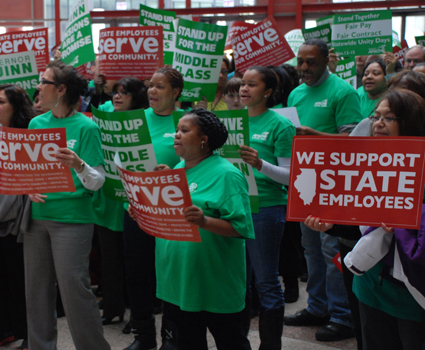Strike authorization vote underway
 One year ago, Governor Bruce Rauner walked out on negotiations for a new contract with state employees. Then and now, employees have made clear their willingness to return to the bargaining table and work constructively to find common ground. But the governor has rejected compromise at every turn.
One year ago, Governor Bruce Rauner walked out on negotiations for a new contract with state employees. Then and now, employees have made clear their willingness to return to the bargaining table and work constructively to find common ground. But the governor has rejected compromise at every turn.
Just as he has refused to work toward a solution to the state’s fiscal woes—harming citizens all across Illinois—he’s taking the same counterproductive ‘my way or the highway’ approach with his own employees.
These dedicated public servants who protect children from abuse, monitor air and water quality, respond to natural disasters, care for aged veterans, and so much more, stood ready to negotiate, but instead Rauner asked the Illinois Labor Relations Board—which he appoints—to declare negotiations to be at “impasse.”
When the Labor Board granted his request, it opened the door for Rauner to move forward to impose his own extreme terms on state employees, including elimination of all safeguards against irresponsible subcontracting, a four-year wage and step freeze and a 100% increase in employee health care premiums.
The wage freeze combined with such a steep health care hike would mean a $10,000 pay cut for the average state employee. That might not be much to Rauner, but it’s too much for the rest of us.
AFSCME has appealed the Labor Board’s decision and successfully secured a temporary stay that prevents the governor from imposing his terms for the time being. However, the stay could be lifted at any time.
Recently, in an effort to break the year-long stalemate, AFSCME took the unprecedented step of putting forward a new settlement framework that significantly modifies the union’s previous positions on core economic issues. Under this framework, employees would receive no base wage increase for four years—and pay a modest increase in their health insurance costs.
Unfortunately, rather than welcoming these more-than-reasonable terms, and working to chart a new course to a fair settlement, the governor is still refusing to make any compromise whatsoever. Within hours of receiving the union’s letter regarding the new framework, he dismissed its terms as “superficial” and wildly exaggerated their potential cost to the state.
That’s why AFSCME members are now deciding whether or not to authorize their Bargaining Committee to call a strike.
The Strike Authorization Vote is taking place in each local union through February 19. If a majority of union members vote ‘yes,’ that that does not necessarily mean there will be a strike—as the Bargaining Committee will continue to do everything possible to reach a fair settlement. But it does mean that if all such efforts fail, state employees will be prepared to go out on strike if the Committee issues the call.
The AFSCME Bargaining Committee recommends voting YES. For more information, state employees can visit the State Contract Info Center.